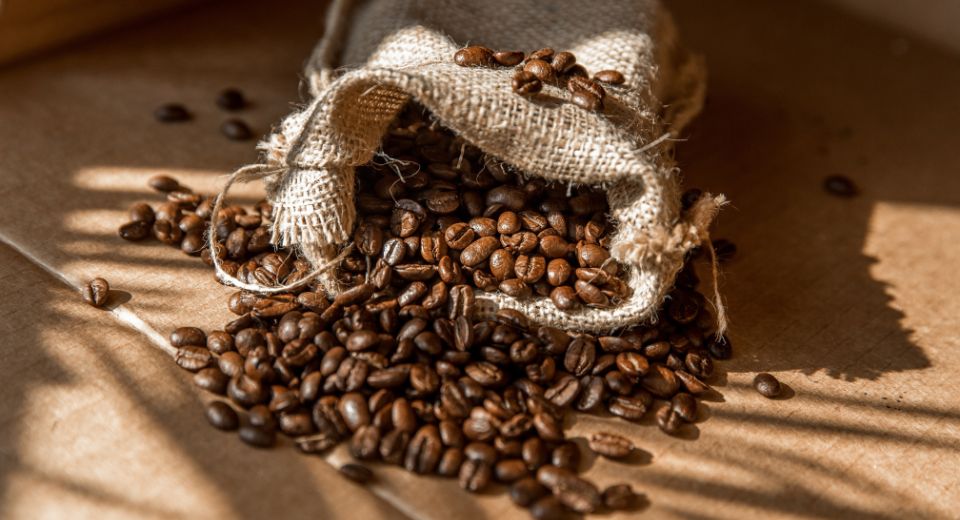How Long Do Coffee Beans Last? – Best Way To Store & FAQ’s

How long do coffee beans last, anyway? When you rely on coffee to get you through the week, it can be disheartening to open a bag from your favorite coffee club and find it completely stale.
Just like any other food, coffee is susceptible to common issues such as oxygen exposure, light exposure, and temperature changes. When a single bag can cost you more than what you make in an hour, you want to conserve it to the best of your ability.
I want you to enjoy the freshest coffee possible, roasted or green. Keep reading to learn about how to spot bad coffee and extend the life of your hard-earned purchase.
The short answer to “How long do coffee beans last?” is 8 to 12 months, but there are other factors that can affect the freshness of your bean. I will break it down more in-depth for you.
Do Coffee Beans Go Bad?
The short answer: is yes, coffee beans absolutely can go bad. The long answer: there are several ways coffee can reach the unpleasant descriptor of ‘bad’.
Coffee that’s extremely old will become stale and flavorless. It’ll start losing its signature aroma and you may notice the mouthfeel being more watery than anything. However, stale coffee is still perfectly safe to drink. What you don’t want to drink is coffee that’s spoiled.
How Can You Tell if Coffee Has Gone Bad?
Spoiled coffee will have a funky odor similar to dust or mildew. Have you ever accidentally left laundry in the washer? Think that, but coming out of your coffee bag.
While stale coffee is still safe to drink, spoiled coffee could be bad for your health. Mildew is closely related to mold, a fungus that can cause everything from breathing issues to allergic reactions.
Remember the age-old saying: when in doubt, throw it out!
How Long Do Roasted Coffee Beans Last?

Have you wondered how long coffee beans last at room temperature? That depends on how well you store roasted coffee in the long term – expect between eight to twelve months for an unopened bag before the flavor starts fading away.
The roast level of your coffee also affects how long it’ll last. Darker roasts degrade a little faster than lighter roasts due to the lack of acidity. Basically, a dark roasted bag might start to lose flavor after a week, while a light roasted bag might retain its flavor for two to three weeks.
How Long Do Coffee Beans Last After Being Opened?
Keeping coffee beans unopened protects them from oxygen exposure. Once you open the bag, give it about a week or two before it starts losing flavor.
In my experience, wrapping up your bag tightly and keeping it stored in a cool and dark place will retain most of the flavor for three to four weeks.
How Long Does Ground Coffee Last?
Ground coffee degrades much faster than whole beans. Don’t expect the flavor to remain for more than two or three days.
If you want the freshest coffee, grind your beans right before brewing them. If you need to carry ground coffee on-the-go, get an airtight container.
How Long Do Coffee Beans Stay Fresh in Your Machine?
If you’ve ever forgotten your coffee beans in your electric grinder, keep in mind they’ll start to go bad faster. Since you’ve already exposed them to more air, they’ll start losing freshness faster than if they stayed in an airtight bag.
While there’s no precise number on how long they’ll stay fresh, it’s safe to snip a few months off the classic eight to twelve-month timespan.
How Long Do Green Coffee Beans Last?

Green coffee is the term for coffee that hasn’t been roasted yet. Home roasters are becoming more common as more drinkers decide to control the roast level – and therefore the flavor – of their beans.
Green coffee beans can last up to a full year and retain the complexity of their flavor, aroma, and mouthfeel. You can even buy frozen green coffee in vacuum seal packs to keep them in the long-term.
Can You Grind Green Coffee Beans?
You can, but it’s not a great idea. Green coffee beans will not only lack the delicious flavors of roasted coffee, but they’re also rock-hard and may damage your grinder.
Instead of using your coffee grinder, consider putting green coffee beans in a blender and putting them into a smoothie. Raw green coffee has health benefits such as lowering blood pressure and contributing to weight loss. They still have a lot of caffeine, though, so skip this suggestion if you’re caffeine sensitive.
How to Store Your Green Coffee Beans

Green coffee is similar to roasted coffee in that it requires a cool, dark place. I recommend keeping your green coffee in an airtight container away from light or heat.
While you might be tempted to keep your green coffee in a bag, it might not be airtight enough to keep oxygen out.
Does Green Coffee Need to Be Refrigerated?
Absolutely not! Refrigeration is a death sentence for coffee – green or roasted – because it increases the chances of causing mold and mildew.
How to Store Your Roasted Coffee Beans

Should you use the bag or the tin? When it comes to roasted coffee beans, understanding what makes them degrade is essential to long-term storage.
Oxygen, light, heat, cold, and moisture all need to be kept away from roasted coffee. You can make the flavor last longer by keeping your coffee in a tight bag or a jar. Make sure not to store your coffee somewhere cool and dark, such as your cupboard. Temperatures that are too hot or too cold can speed up the degradation process.
Signs You Have Extra Fresh Coffee Beans

Before I dive into frequently asked questions, you should also look for positive signs of quality coffee! Coffee is a dynamic ingredient with many ways of communicating its freshness and flavor.
A Beautiful Luster
Do your coffee beans have a glistening sheen to them? That luster comes from their natural oils, an essential part of what makes coffee so aromatic and flavorful.
To contrast, beans that are matte – or very dry – will have less flavor. That doesn’t necessarily make them bad, but it’s something to keep in mind when purchasing!
Slight Oiliness
The oiliness goes beyond the surface. When you grind your coffee, take a moment to feel a sample with your fingers – a very subtle oily texture is a sign you’ll get a delicious brew.
This oiliness is not the same thing as mildew or dampness. As long as the beans were perfectly dry before grinding, this subtle moisture is a good sign!
A Vivid Aroma
Last but not least, a vivid aroma is a powerful sign you’ve picked a good brand. Your coffee should waft out of the bag and fill the room.
If your coffee barely has any scent – or even smells funny – you won’t get a very good cup. Again: if you smell mildew or anything leathery and rubbery, toss it.
How Long Do Coffee Beans Last – FAQs
Have a few more questions about how to keep your coffee beans fresh and tasty? I’ll answer several below.
Can You Drink Two-Year-Old Coffee?
As long as two-year-old coffee doesn’t smell like an old sock, go for it. It won’t exactly be a masterpiece of flavor, but it’ll just be stale and otherwise boring to drink.
Also: while two-year-old whole coffee beans might have a shred of flavor left, don’t expect much from two-year-old ground coffee.
Is Freezing Coffee Beans a Good Idea?
While you should never refrigerate your coffee beans, you can freeze them! Just keep in mind this rule only applies to whole-roasted coffee beans.
You can freeze whole roasted coffee for about a month before it starts to degrade. Once you pull them out of the freezer, use them as soon as they thaw.
Does Green Coffee Taste Like Coffee?
So much of the classic coffee flavor comes from the roasting process. While green coffee might have a hint of this flavor, it’ll taste much lighter and a touch grassy.
In fact, some green coffee drinkers compare the raw product to herbal tea.
What Does Old Green Coffee Taste Like?
Old green coffee won’t inspire romantic memories of long, peaceful hours in your local cafe. The aging process introduces rather unpleasant flavors such as leather or grass.
Old green coffee can also sometimes take on the flavor of whatever it’s being carried in, such as a burlap sack. Always double-check the date of your green coffee – anything after the twelve-month mark is suspect and should be inspected carefully. If you suspect mold or mildew, toss it.
What are the Defects of Green Coffee?
Green coffee graders closely inspect these beans for possible defects such as insect damage, mold, or fungus. However, accidents still happen and you can end up with a batch that’s gross or even unsanitary.
When inspecting your green coffee, look for possible issues such as:
- Dark spots
- Mold growth
- Funny smell (like mildew or leather)
- Insect damage (such as tiny holes)
- Pale color




